#anyways I think its real easy to judge Momoi esp cause
Explore tagged Tumblr posts
Note
Hebi Anon
Yeah, that little scene of Taro tossing Haruka aside cemented him in my mind as an asshole
Haruka and Saruhara were nothing but nice and helpful this entire episode. They saw he was basically ill and, completely of their own accord, went to find answers and a solution.
Sure the first time it didn't work properly because Jin is an asshole who withholds critical information (about his SON) for no reason, but it did help. Taro would never have been able to save so many people during that chase if they didn't give him that first round of kibi dango. Then they again go out of their way to do it properly. Even when Kaito ends up bringing one too little, Taro even admits that (somehow, why is never explained and that's a writing pet peeve of mine), Haruka's actions made up for that deficit.
And then he just tosses her aside without even a thank you. For what? For laughs? Haruka has been nothing but helpful and he does that? There is no amount of neurodivergency that can excuse that, that's just the actions of an asshole.
Once you get up to the point where I gave up on Donbrothers I'll give a full write up of why I hate Taro (warning in advance, it actually involves some deep seated traumatic rage)
Time to put on my Momoi-Apologist glasses (LOL)
I should preface this first: Your thoughts are completely valid. I can see why you'd dislike Tarou after he throws Haruka halfway across the yard, rip. Seems like he's just taking her effort for granted and being a huge jerkwad. I just hope y'all Momoi antis can take a few deep breathes and come into my analysis with an open mind. Cause I love discussion.
I'm also prefacing that I'll be quoting from academic material and books as well, so prepare for that. This will probably be unnecessarily long so I'm putting a cut here too
:]
Me and Nacho actually discussed Momoi quite a bit, and one thing that had continued to stump me was how Momoi would completely change his personality the moment he transformed.
Dude just idk became iNSANE to me. And so I really was like ???
So here's a set of questions I'm going to try and answer and explain.
(1) Why does Momoi's personality change when he becomes Don Momotaro?
(2) Why does he answer everything he's asked?
(3)Why does he hit or disrespect his teammates or attack them in battle when he says he "doesn't hit people"
Let's get into it.
So first:
" And then he just tosses her aside without even a thank you. For what? For laughs? Haruka has been nothing but helpful and he does that? There is no amount of neurodivergency that can excuse that, that's just the actions of an asshole."
Quoting this down here because I disagree. "There is no amount of neurodivergency that can excuse that, that's just the actions of an asshole." I think its really easy to see Momoi's behaviors and label him an a$$hole.
But he acts like that for a reason.
He's on the spectrum.
I’m not equating being on the spectrum with ‘bad’ or ‘ rude behavior. I’m saying Momoi deals and processes and copes in a different way.
(Is this an excuse? No. But I want it to be noted here that his mind fundamentally works differently. ADHD is similar to Autism in a lot of ways, but there are still a lot of differences, and that doesn't account for differences among individuals as well.)
So let's get to it.
(1) Why does his personality change?
(Inserting a conversation I had with Nacho about this. For context, we where discussing episode 7, when Momoi calls them, Haruka and Haiku, his "companions". Nacho told me what word he was saying and why they reacted like that LOL. )
Nacho:
So tomodachi, to me that word insinuates an affection between two people, like high school classmates. Japanese school, you see the same people you're whole life so your bonds with your school friends are just a tiny step down from family
So it might not necessarily be a deep friendship, but it's the most obviously affectionate
Nakama is more about a bond like you're people on a journey. So like, less affection, but more devotion. Like you feel a strong loyalty to someone, but you might not define yourselves as close in any sense of the word
And then Tarou freaking says that they're his お供 (otomo) LOL!!!!
Which is very, Idk, it sounds archaic
It give me a mental image of a rogue vagabond and is 5 sidekicks. In medieval Japan.
Otomo is different than otmodachi. Like it's spelled different too :))
お供 (otomo) is spelled with the kanji for submit/offer/serve/accompany
Which is why it gives this image to me (rogue vagabond). And why it's HILARIOUS that he called them that.
Basically "you're my sidekick companions"
No wonder his friends were like "HUH????" Truly the appropriate reaction.
Ngl, now that the idea was planted, Tarou does remind me of my autistic family members
Idk, maybe fixated is the wrong word but Idk the correct ones. But having a preference for certain speech patterns and not differing from them to incorporate nuance in conversation.
Like Idk all the context, but like for whatever reason, Tarou is attached to talking or referencing or alluding to archaic language. Assuming that Tarou is on the spectrum, he might not be able to really incorporate the nuances of molding himself into the legendary hero he wants to be—hence he adapts old language and this goofy personality bc it comes with the package of being Momotarou.
It'd be like if I thought to myself that I want to mold myself into a Superman-esque persona, but I also put on the blue spandex and wore fake glasses randomly
Those things have nothing to do with what Superman's admirable qualities are, but I'd be unable to take some qualities and leave the other, have to do things in black and white.
Me: Woah. I was wondering why Momoi always acted insane specifically when he transforms. Like he doesn't normally go around WAHAHA'ing
Nacho: Right. I mean that part especially reminds me of my autistic family members LOL. Definitely should read up more about it, but adhering to some sort of predictable character/caricature that they admire, that brings comfort. It's jarring for people not on the spectrum bc we read social cues that tell us some behaviors are odd, but others can't tell that.
Like it's obvious not to randomly laugh like a maniac to us, but it's not obvious to people on the spectrum.
[I ask about why Momoi answers every question he's asked]
Nacho: Pasting this from the American Journal of Medicine,
"Autistic patients commonly demonstrate restricted, repetitive, and stereotyped patterns of behavior. For example, as children or adults, autistic individuals may continue to repetitively handle and play with objects such as toy automobiles rather than interacting with other persons. These repetitive actions are referred to as “stimming”—self-stimulating behaviors, usually involving repetitive movements or sounds.""
Nacho: I'm sure we all know this to some extent but you know, using a real source this time LOL
So yeah with this, for people who aren't autistic, change is normal
J: but people with autism need the repetition?
Nacho: Yeah exactly, for autistic people, rigidity is normal, not change .So even people who are neurodivergent and can't pick up social cues, they will naturally try to find the answer.
J: I see, that's why when change is introduced to them, it can tend to cause a lot of stress....right?
Nacho: Right, and from my understanding, the idea that you can change your behavior, that's foreign.
I don't want to assume that there ISN'T any truth to the argument that Tarou is not trying to change. BUT I think it's important to consider how change is something that's only normal to some people.
Like in a more physical manifestation of autism, a kid might do repetitive things like scratching their ear right? Someone might say "why aren't they trying to change?"
Especially when they get older. But the idea that someone would think "man, I should change this thing I'm doing"--that doesn't even register as an option
It's like a tricky multiple choice question
Where you have answers A and B
And then the teacher tells you it should've been C: neither. And you're like "BUT THAT WASN'T AN OPTION"
Again,
I don't think Tarou realizes that avoiding to talk is even an option. It's only A or B
/end of our conversation/
(This was all Nacho's brilliant analysis lmao. I noted when I talked or when J talked. So if I didn't note it specifically, assume Nacho was talking.)
Anyways, this brought me the realization that Momoi's personality changes because he's putting on a character, a 'persona'. He doesn't know how to be the hero "Momotarou" without it.
It's easy to imagine too.
Like Jin named Momoi after the Momotarou fairytale. It would be a fair assumption to think that he would then read him the fairytale or tell him about it?
And so Momoi is essentially doing what the fairytale Momotarou did.
Heroes being pricks isn't a new concept either. A lot of them are portrayed as having a sort of natural "bravado." Like Tony Stark for instance. He's arrogant, a narcissist, AND he's rude. And you can see some of that bravado in Momoi.
NOW! Time to get on quotes from my research.
This topic had me looking into books, and so I read "Uniquely Human" by Barry M. Prizant.
And this gave me the language to analyze Momoi and somewhat hypothesize why he acts the way that he does.
"When a child with extreme sensory sensitivities enters a noisy room and cups his hands over his ears and rocks his body, this pattern of behavior is simultaneously a sign of dysregulation and a coping strategy. You could call it “autistic behavior.” Or you could ask “Why is he doing that?” The answer is twofold: the child is revealing that something is amiss and that he has developed a response to shut out what is causing him anxiety."
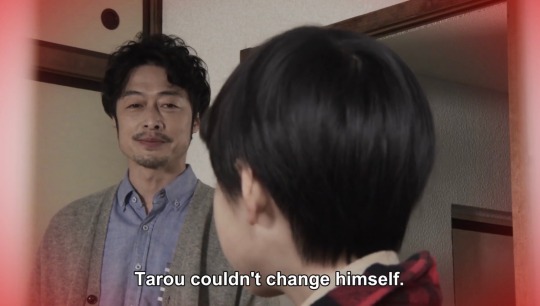
"Whether or not we realize it, all humans employ these rituals and habits to help us regulate ourselves—soothe ourselves, calm our minds and bodies, and help us cope. Perhaps, like many people, you find public speaking unnerving. To calm yourself, you might take a series of deep breaths or pace back and forth while you speak. That’s not exactly the way humans typically breathe or behave in public, but an observer would not judge this as deviant behavior. The person would understand that it’s your way to cope with the stress of the situation and to soothe your nerves so that you can do your best.
When I return home from a day of work, I immediately check the mailbox, then sort the mail, placing bills in one pile, magazines in another, and tossing what I don’t need in the recycling bin. It would take a significant distraction for me to skip that small but important ritual; then I would feel out of sorts on some level until I took care of it. It’s a calming routine; it’s how I come home.
For people with autism, comforting rituals and coping mechanisms come in all varieties: moving in particular ways, speaking in various patterns, carrying familiar items, lining up objects to create predictable and unchanging surroundings. Even proximity to certain people can serve as a regulating strategy. After coming home from a busy school day, Aaron, who was eight, had a habit of placing both palms on a table in front of him and then rhythmically jumping in place. His parents noted that the intensity and duration of his jumping were a good barometer of how stressful his day had been. Just as infants are comforted and soothed by being rocked, and toddlers run in circles to stay awake, we all use movement to modulate our emotional and physiological arousal.
If people with autism feel underaroused, they increase their alertness by spinning, bouncing, or swinging. If they’re overstimulated, they might calm themselves by pacing, snapping their fingers, or staring at a fan.
Ok. Let's take a break from quoting LOL!
I bolded this part because it really stood out to me; things were beginning to make a lot of sense with this knowledge in the back of my mind as I re-examine some of Momoi’s behaviors.
What does Momoi do every time he transforms, or right before he does something crazy? He laughs.
"WAHAHAHA." <-He does this because it helps increase his alertness.
Likewise, in episode 7, why do you think Momoi got out his fan right before he aggravated the MOTW? It's because he was upset at his comrades being attacked and he needed something comforting to focus on, to help him calm down. After he gets it out he starts laughing --> He's ready to be Don Momotarou.
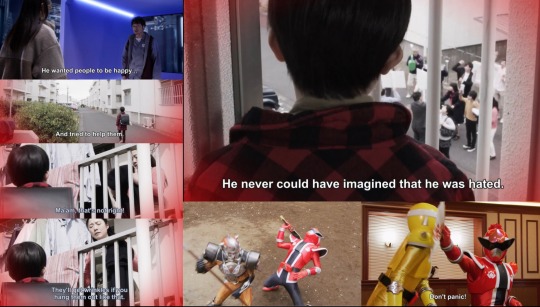
Tarou needs to "flip on" his Don character when he goes into fighting because it makes having to fight a possibility for him. He's changing the script from "battle" to "play/game".
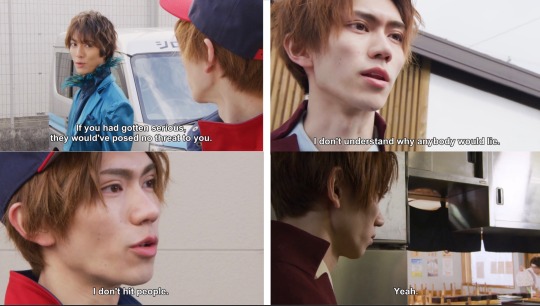
Un-transformed he says "I don't hit people" and this is true.
But transformed he does; like in this Haruka example listed by Hebi anon. He does (hit people) because he has to and this helps him cope with that.
Now, so why did he hit Haruka / attack his comrades? >:)
Quote: (Uniquely Human)
Seeking to eliminate behavior without fully understanding its purpose is not only unhelpful; it also shows a lack of respect for the individual. Worse, it can make life more difficult for the person with autism. That was the case for Lucy, an eleven-year-old. Her public school teachers had reported that Lucy, who did not speak, was an extremely aggressive child, prone to unpredictably lunging and clawing at the faces and necks of teachers and therapists. When I spent a morning observing her in my role advising the district, the problem became clear. Much of the work the educators and therapists were doing with Lucy consisted of matching exercises; they repeatedly asked her to match pictures and images on cards or to point to pictures on command.
I quickly deduced why Lucy appeared to be springing at her teachers. In the midst of the activity, the assistant abruptly changed course. She stopped showing pictures and instead wrote Lucy’s name on a card, placed it in a row with other cards, and asked the girl to identify it. Almost immediately Lucy dove toward the young woman, trying to pull on her blouse in protest.
Why?
The therapist had shifted the pattern, changing the rules without warning.
When a highly anxious child craves routine to understand the world, it’s no wonder a sudden change throws her off. To test my theory, later that day I watched Lucy stroll with a teacher along a familiar school hallway. Then I suggested that the teacher alter the route from the usual routine. When she did, Lucy, suddenly upset, again lunged and grabbed at the teacher’s neck and blouse just as she had before.
It was clear that the grabbing wasn’t aggressive behavior; it was a plea for support at a moment of extreme confusion. Lucy didn’t intend harm. She was confounded during a familiar activity; she had become more anxious and dysregulated, approaching a state of panic.
....
So Momoi didn't intend on harming Haruka here, but because he spent the entire episode ill and vulnerable, what was routine had been changed. He did this as "a plea of support at a moment of extreme confusion." Basically, the power dynamics in their "play" shifted. He had been relying on Haruka (when he usually doesn't rely on anyone, mostly always in control of the battle) and by throwing her he's doing it to show thanks.
"I am able to be myself again. You helped me go back to being a hero." (Play his role)
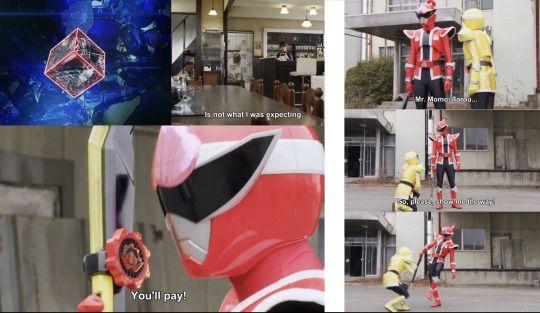
Haruka had shifted the pattern, changing the rules. Likewise, when they went to defeat the monster in episode 3 and FAILED -- she swears fealty and he responds by kicking her and then attacking his teammates (LOL). This is because Sononi disrupted the pattern (defeat monster, save person). She interrupted the routine and killed the monster/human and Momoi didn't know how to regulate himself. Therefore he chose to attack his teammates.
Esp because he only attacked Haruka AFTER she swore fealty, so basically, she was saying "yeah I'll be ur helpful sidekick" and at that moment Momoi needed help getting rid of his anxiety/aggression/confusion at the routine being disrupted and a person being killed.
In episode 7 they ask him "yo, if we're ur companions why did u attack us?" And Momoi said it was to train them so 'they wouldn't hold him back'
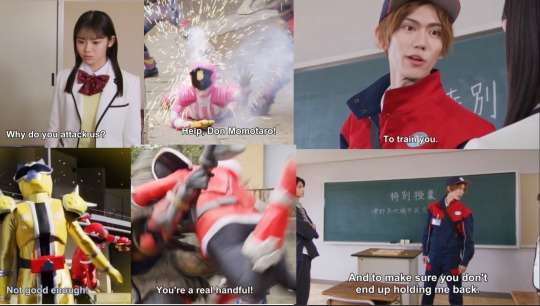
For me, I think what Tarou's really trying to communicate, is that he attacks them because HE sees it as a way to protect his friends from being harmed. The first time he ever attacked them was in the episode where his routine was interrupted and they failed to save someone. I don't doubt this made Momoi upset, and anxious. He doesn't want his friends to die like that monster did and he doesn't want more monsters to die (in general) therefore --> attacking his teammates = training = they can protect themselves and save monsters ergo his routine won't get interrupted and they won't be "holding him back"
"Holding him back" can also metaphorically mean emotionally. Like instead of holding him back cuz they're weak, it's more they're holding him back because if he's busy being worried/anxious about them he won't be able to focus on the battle.
...
Another book I read for research "The Reason I Jump: The inner-voice of a 13-yr-old Boy With Autism"
(Notably, the boy who wrote/answered the questions asked in the book was 13 at the time, and also he's Japanese as well, so I’d say it’s culturally relevant. I knew it would be nice to have varied voices/sources. So I included this.)
"Sometimes, people with autism speak with a strange intonation, or use language in a different way. Non-autistic people can sort out what they want to say in real- time, while they’re having their conversation. But in our case, the words we want to say and the words we can say don’t always match that well. Which is why our speech can sound a bit odd, I guess. When there’s a gap between what I’m thinking and what I’m saying, it’s because the words coming out of my mouth are the only ones I can access at that time. These words are either available because I’m always using them or because they left a lasting impression on me at some point in the past. ."
Now this next quote I'm putting down is because it directly reminded me of Haruka, Haiku, and Momoi's episode 4 Cafe conversation. The scene starts with Haruka and Haiku bombarding Momoi with questions.
"You normal people, you talk at an incredible speed. Between thinking something in your head and saying it takes you just a split second. To us, that’s like magic! So is there something wrong with the circuitry in our brains? Life’s been tough for people with autism, pretty much for ever, yet nobody’s really been able to identify the causes of autism. For sure, it takes us ages to respond to what the other person has just said. The reason we need so much time isn’t necessarily because we haven’t understood, but because by the time it’s our turn to speak, the reply we wanted to make has often upped and vanished from our heads.
“I don’t know if this is making a whole lot of sense to you. Once our reply has disappeared, we can never get it back again. What did he say again? How was I going to answer her question? ... Search me! And all the while, we’re being bombarded by yet more questions. I end up thinking, this is just hopeless. It’s as if I’m drowning in a flood of words."
Momoi's reaction and response here now make a lot more sense, right? You can actually visibly see how Momoi is taken aback by all their questions. He looks uncomfortable. Unsure.
Vulnerable.
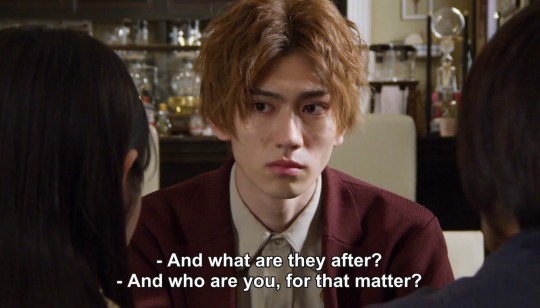
He isn't condemning them or mocking them and saying "just do what you're supposed to do, why are you asking questions." He genuinely doesn't know and he's anxious from all the questions they spring upon him. He doesn't even know how to answer the first one and he's drowning in all their words.
Like, is it really a wonder he stood up, turned AWAY from them (not looking at them) and instead went and sat at a counter before asking his question?
And what he asked was if it was really necessary to know the reason for everything. Now, consider this, what if this is another echo of things he's heard? Perhaps how Jin has responded to his questions before?
He's anxious and stressed from their questions, it wouldn't be surprising if he fell back on a response he's heard before.
.....
This below quote reminded me of the end of episode 4 when Momoi's job is essentially finished and so he stops showing up to the Oni-giri shop/the consultant work place. AND the added cut to him being alone by the pier.
"‘Ah, don’t worry about him – he’d rather be on his own.’ How many times have we heard this? I can’t believe that anyone born as a human being really wants to be left all on their own, not really. No, for people with autism, what we’re anxious about is that we’re causing trouble for the rest of you, or even getting on your nerves. This is why it’s hard for us to stay around other people. This is why we often end up being left on our own.
The truth is, we’d love to be with other people. But because things never, ever go right, we end up getting used to being alone, without even noticing this is happening. Whenever I overhear someone remark how much I prefer being on my own, it makes me feel desperately lonely. It’s as if they’re deliberately giving me the cold-shoulder treatment."
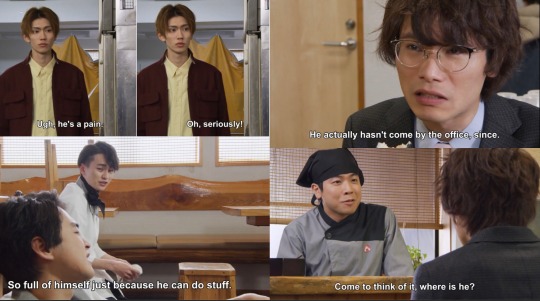
(Honestly this BREAKS my fkin heart. Because this is so obvious in that lonely pier shot of his. Just the contrast of the people celebrating at the Onigiri shop, and Momoi all alone, staring off into the distance at the deep waters in front of him.)
To me -- at this point, it's painfully obvious that Momoi is on the spectrum. (IMO. He’s at least exhibiting a lot of traits / is coded that way) I know you (Hebi anon) said you had trouble with his behavior or the things he says, but when you look at it through this lens it all starts to connect.
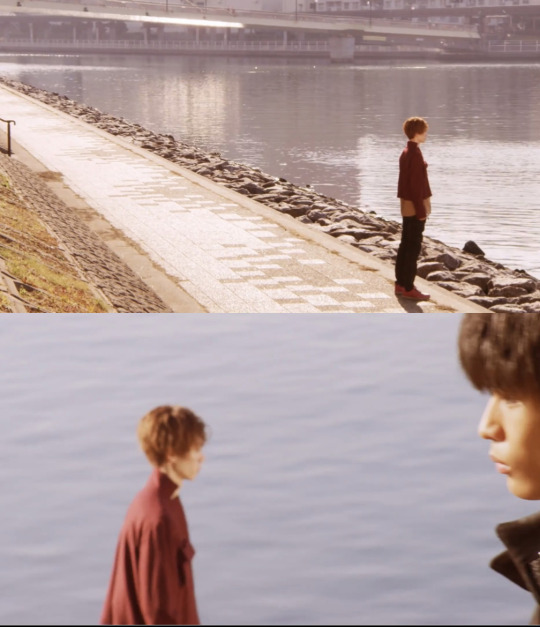
First, I need to say, Momoi isn't doing ANY of this maliciously. Even his attacks on Haruka. If you're like "that doesn't make any sense" -- well, exactly. Because we aren't looking at it from Momoi’s context. When you ask "WHY" and examine his actions and the context it's in, it puts things into perspective.
(Uniquely human quote:)
That’s a common theme in the children with whom I have worked. Animated movies of all kinds hold a particular fascination for children on the autism spectrum, capturing their attention like almost nothing else. Why?
Many children find the predictability and consistency of animated characters (as well as the music) comforting, a welcome contrast to the unpredictable nature of real people in everyday situations. In Monsters, Inc. or Madagascar, the characters’ vocal, facial, and body language is exaggerated, making emotions easier to decipher for such children. People with autism also find the clear delineation of good and evil characters an appealing alternative to the more nuanced gray areas they encounter in real life. And repetitive viewings engender a reassuring sense of familiarity and mastery.
--> This is why Don Momotarou is so....animated and exaggerated.
And for why he laughs, or repeats phrases? Like the "It's a festival!" Phrase? It's delayed echolalia, or scripting.
Echolalia is something that can be seen as a one commonality for a good handful of people on the spectrum. Essentially they're echoing the words / phrases of things that they hear. And this can be for MULTIPLE reasons.
(1) Because they like saying the phrase and it gives them comfort.
(2) To ask a question
(3) As a self-soothing ritual or coping mechanism to help them with their situation.
etc. etc. etc.
To share an example….yes from Uniquely Human 🤪:
“One day we had the children create an art project with paints, but instead of paint brushes, they used pieces of sponge. Afterward David discovered bits of the cut-up sponge on the floor of the classroom. Just as he had with the fuzz balls, he began picking them up one at a time, closely examining each as he rubbed it between his fingers, savoring the texture. “That’s a piece of sponge,” I said. “That’s a piece of sponge,” he echoed. “That’s a piece of sponge, sponge, sponge!” Again I could see the joy he derived from the combination of the feeling of the material and the sound of the words coming out of his mouth. As he clutched the bits of sponge in his cupped hands and looked at the others on the floor, he began to dance around the room on tiptoes. “That’s a piece of sponge, sponge, sponge!” he kept saying. “That’s a piece of sponge!” The real revelation came the next day. By then the classroom had been cleaned. We had cleared away the art project and someone had straightened up and vacuumed away all the debris. When David arrived in the classroom, though, he returned to exactly the spot in the room where a day earlier he had come upon the sponge bits. I watched as he repeated his dance, shifting his gaze to me and saying, “That’s a piece of sponge, sponge, sponge! That’s a piece of sponge!”
Consider this:
What if a visitor had happened into the classroom that day to observe the children? Imagine such a person watching this little boy coming into the room, full of energy, and then performing a little dance and babbling on about a sponge. The visitor might easily have dismissed the behavior as absurd. Or silly. Or random. The visitor might have questioned David’s grip on reality—or at least his understanding of the word sponge.
But if you had been in the room the previous day, if you had shared the conversation with David that I did, if you knew about his enthusiasm for new textures, then you would have understood exactly what was going on. This little boy was recounting his experience of the previous day—not only the facts of the experience (the materials used in the art project) but, more important, his own feelings of excitement about it.
He was telling a story."
(end quote example.)
So what story is Momoi telling? Well, I'd like to examine that scene in episode 4 -- the flashback to Momoi's past.
When he sees those protestors he says to Jin:
"Its a fun festival!'
Now, I'm beginning to realize he didn't say that just because he thought that was what it was. He's echoing something he probably heard Jin or someone else say -- the time they went to a festival. More than that he's probably asking a question: It's a fun festival, Jin! -->Look at all the people gathered! Why are they gathered? Are they celebrating? What's going on?
He's asking a question, through delayed echolalia as well as making an observation.
Here's another example (from Uniquely Human, I really recommend reading it LOL) :
"Often children use echoes to tell us what they’re thinking, but rarely in ways that are immediately obvious. The father of Kyle, a young boy with autism, once invited me to join the two of them on a sailboat in Narragansett Bay, Rhode Island. In the middle of a lovely afternoon, we were anchoring in a little cove when the boy began running up and down the deck as he anxiously leaned over to peer into the water. “No dogs! Dogs bite!” he kept saying with increasing urgency, looking back at his dad. “No dogs! Dogs bite!” No dogs? We were out on the water, with no other boats nearby—no people, no animals. Just waves and wind. What could he have been talking about?
His father knew exactly what he meant. “He’s asking if he can go swimming.” I asked the father to explain.
He told me that Kyle had a fear of dogs. When he felt anxious about his safety, that was how he expressed it: “No dogs! Dogs bite!” Now he wanted to go swimming in the shallow cove, but he wasn’t sure whether this was a safe place, so he was asking. With that phrase he accomplished three things: he expressed his fear, requested permission from his dad, and made sure it was safe. And when his father responded “It’s okay, it’s safe! No dogs!,” Kyle jumped in with great glee."
This example.....is so good. Now some of what Tarou says or does makes a lot more sense.
When he goes into battle he scripts it as "a fun festival" because he's using an echo of a fun experience from his childhood, an experience that obv left a lasting impression. One that can comfort him, or that he can use to cope with being thrown randomly into battles and fighting.
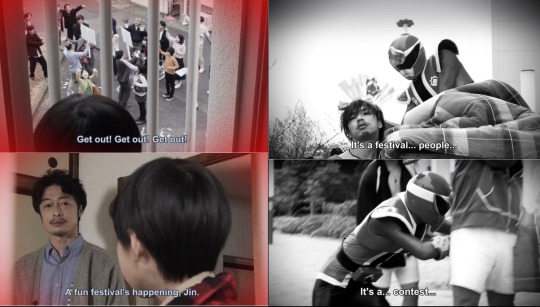
It's not so scary if he's a hero, right? Like the ones in his fairytales. Because heroes ALWAYS beat the bad guys.
Even more than that -- he can deal with it if its a game or contest or festival. "This isn't a scary life-or-death experience. This is a fun game!" This is how Momoi copes.
Now, onto Momoi and his thing with mistakes/weaknesses:
(Taken from An Autistic Japanese 13 yr old's own account)
“When I see I’ve made a mistake, my mind shuts down. I cry, I scream, I make a huge fuss, and I just can’t think straight about anything any more. However tiny the mistake, for me it’s a massive deal, as if Heaven and Earth have been turned upside down. For example, when I pour water into a glass, I can’t stand it if I spill even a drop.
It must be hard for you to understand why this could make me so unhappy. And even to me, I know really that it’s not such a big deal. But it’s almost impossible for me to keep my emotions contained. Once I’ve made a mistake, the fact of it starts rushing towards me like a tsunami. And then, like trees or houses being destroyed by the tsunami, I get destroyed by the shock. I get swallowed up in the moment, and can’t tell the right response from the wrong response. All I know is that I have to get out of the situation as soon as I can, so I don’t drown. To get away, I’ll do anything. Crying, screaming and throwing things, hitting out even…
Finally, finally, I’ll calm down and come back to myself. Then I see no sign of the tsunami attack – only the wreckage I’ve made. And when I see that, I hate myself. I just hate myself."

Ok. I'll end my essay here.
I just want to say, Momoi's action make sense if you look at it from his context with a lens of what people who are autistic / on the spectrum are like. Sorry for such a long response man :x,
#hebi anon 🫡🤝💋#I...honestly I don't know if you'll get anything out of this LOL#anyways I think its real easy to judge Momoi esp cause#he's good at a lot of things and kinda stoic#But believe me homie he really REALLY needs help for social things#my thougts#avataro sentai donbrothers#donbrothers liveblog#donbrothers#donbrothers analysis#donbrothers meta#9 peach falls#before harvesting season#who let delivery boy bring a parade float to a gun fight#sentaisouped#asks#momoi tarou
9 notes
·
View notes